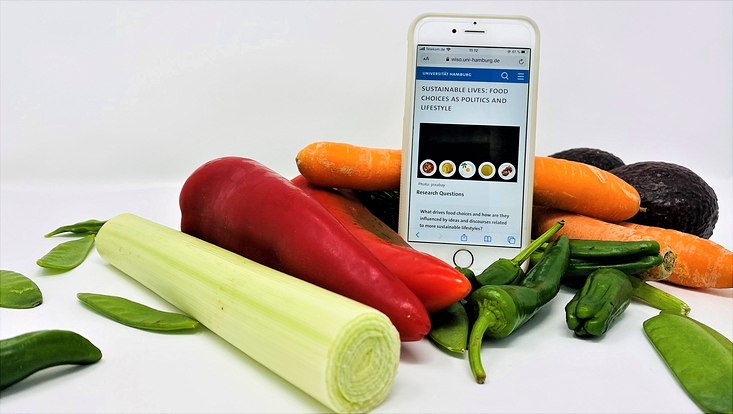Society Research
Interim report of the CSS Working Group "Sustainable Lives"
8 February 2021, by Sustainable Lives

Photo: private
This interim report presents the current progress of the working group “Sustainable Lives” at the Center for Sustainable Society Research (CSS). The working group examines the extent to which sustainability and dietary lifestyles are being considered and practiced in combination. The main research question of the working group is “What drives food choices and how are they influenced by ideas and discourses related to more sustainable lifestyles?”
Research activities
In 2020, the working group “Sustainable Lives” introduced one publication and four working papers about different factors of consumer decisions influenced by sustainability considerations. These deal with the connection of media use and vegetarian lifestyle (Kley et al. 2020), motivating factors of meat reduction (Pauer et al. 2020), sustainable nutrition in terms of social differentiation (Trübner et al. 2020), Covid-19 pandemic and carbon neutrality (Perino 2020) and the impact of reasons to reduce meat consumption on intentions, behaviour and satisfaction (Perino and Schwirplies 2020).
Dissemination activities
The working paper “Meaty arguments and fishy associations: Field experimental evidence on the impact of reasons to reduce meat consumption on intentions, behavior and satisfaction“ (Perino and Schwirplies 2020) was presented as a seminar speech at the University of Innsbruck in February 2020, within the scope of the International Winter School at the TU Bergakademie Freiberg in February 2020 and in June 2020 as part of lecture series “Rethinking Economics” (German: “Von Mutter Erde und Homo Oeconomicus – Und jetzt?”).
The journalism sub-project of the working group “Sustainable Lives” carried on with the analysis of media food reporting. The results of the analysis were presented at the annual conference of the German Communication Association DGPuK (German: Deutsche Gesellschaft für Publizistik- und Kommunikationswissenschaft) in September 2020. The methodical aim of this analysis is to combine the approach of automated content analysis (topic modelling) with the one of qualitative content analysis. The results show that journalistic media reports uncritically about different food choices, in a unbalanced enthusiastic way. The media role, therefore, seems to be more to normalize than to problematize various food choices.
The working group has successfully widened its media presence by giving two radio and three print interviews related to “Sustainable Lives” topics, which are listed below.
Involvement of junior researches
Markus Majewskis doctoral thesis with the working title ”Vegan Diet in Discursive View - A Corpus-Assisted Diachronic Analysis of Veganism Discourse in German Print Media” examines the image of veganism and vegans. The main aim of the thesis is to create an overview that shows how veganism has been displayed in the German print media for the last three decades. In order to study the veganism phenomenon precisely, a diachronic discourse analysis approach is being used. In this thesis, around 10.000 journalistic texts are going to be analysed. The author is currently working on the theoretical framework of the thesis, focusing on the relationship between language, identity and nutrition on the one hand, and summarizing historical discourse considerations on the other hand. The student assistant who is financed by CSS funds is involved in the preparation of the practice-based part of the thesis, which is planned for summer 2021.
Limitations in line with the Covid-19 pandemic
The coronavirus pandemic has affected almost every aspect of our lives, without making an exception in terms of scientific activities. Thus, most of the opportunities to present the working group's progress at scientific conferences or symposia, except the above mentioned, were not given or the events have been postponed due to the Covid-19 pandemic. A joint experiment by Grischa Perino and Henrike Schwickert was planned for 2020 and, unfortunately, also experienced the consequences of the pandemic. The experiment, dealing with meat consumption reduction, had to be redesigned and was postponed several times due to the necessity of collaboration with local restaurants, which were closed in line of strategy against pandemic in Germany. The experiment is currently on hold and alternatives are being discussed.
Literature:
Perino, G. (2020) Zwei auf einen Streich: COVID-19 und die Transformation zur CO2-Netto-Null. Politische Ökologie, 163, 28-33
Kley, S., Kleinen-von Königslöw, K. & Dunker, A. (2020): Media diets of vegetarians. How news consumption, media use and communication with one’s social environment are associated with pursuing a vegetarian diet.
Pauer, S., Ruby, M., Rutjens, B. T., Perino, G., & van Harreveld, F. (2020). Meating conflict: Toward a model of ambivalence-motivated meat reduction. PsyArXiv, https://doi.org/10.17605/OSF.IO/7W69J, submitted
Perino, G. & Schwirplies C. (2020) Meaty arguments and fishy associations: Field experimental evidence on the impact of reasons to reduce meat consumption on intentions, behavior and satisfaction. AEA RCT Registry, November 21, https://doi.org/10.1257/rct.3590-1.0
Trübner, M., Nisic, N. & Kley, S. (2020): Der soziale Raum nachhaltiger Ernährung. Ist nachhaltige Ernährung heutzutage Gegenstand sozialer Differenzierung?
Media appearances related to "Sustainable Lives"
Nach Corona: Was bleibt vom Homeoffice? NDR Info | Aktuell | 28.05.2020
Wie viel Grün braucht der Mensch? Newsroom der Universität Hamburg | 28.10.2020
Wie in Hamburg wohnen - heute und in Zukunft? Treffpunkt Hamburg im Rahmen der ARD-Themenwoche „Wie wollen wir leben?“ | 19.11.2020
Wo Markt auf Moral trifft - CO2-Emissionshandel behindert freiwilligen Klimaschutz. KlimaSocial - vom Wissen zum Handeln | Riff Reporter | 10.07.2020
Solaranlagen: Photovoltaikanlagen werden zur Pflicht. Deutschlandfunk | 20.07.2020
